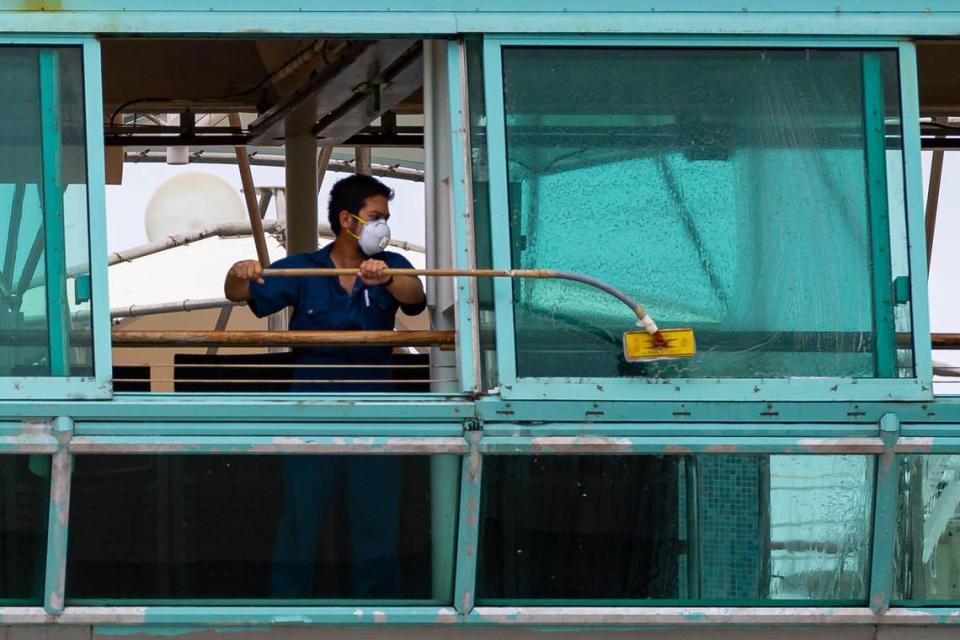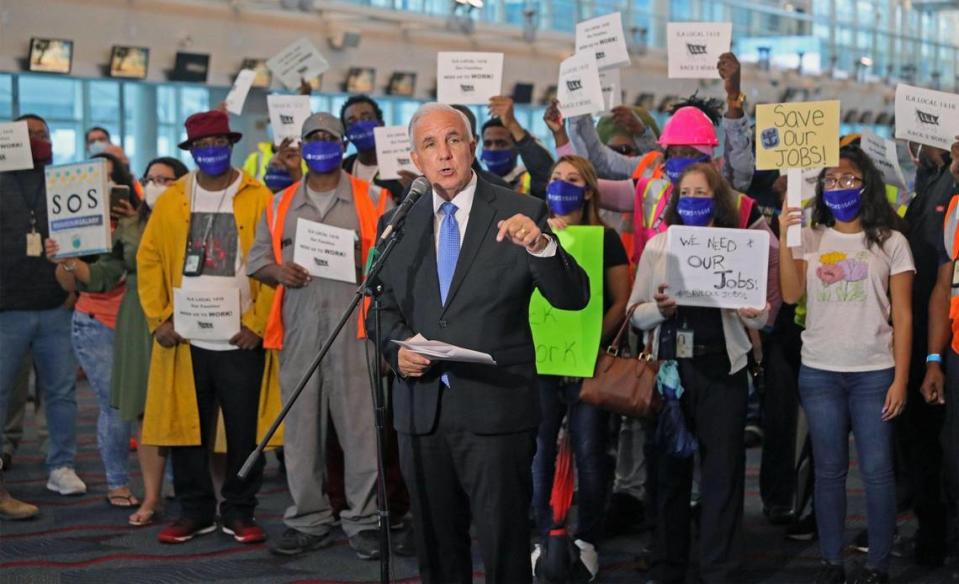CDC lifts cruise ban, says companies can restart once they prove COVID-19 protocols work
The U.S. Centers for Disease Control and Prevention set the stage for the return of U.S. cruising with the Friday release of detailed requirements that could put ships back in operation in the coming months.
The decision from the CDC to let its no-sail order expire on Oct. 31 in exchange for a conditional sail order is a win for the Florida-based cruise industry, which has been paralyzed since the industry stopped passenger operations March 13 amid COVID-19 outbreaks at sea. Still, cruise companies will have to prove to the agency that COVID protocols are working with specific testing requirements and trial runs before passengers can return, and will have to enter into written agreements with land-side medical facilities to treat any affected cruisers.
Most cruise companies — Carnival Corporation, Royal Caribbean Group, Norwegian Cruise Line Holdings, MSC Cruises, Disney Cruise Line, Bahamas Paradise Cruise Line and Virgin Voyages — have canceled all cruises leaving from U.S. ports until at least Dec. 1.
The industry’s lobbying group, Cruise Lines International Association has urged the federal government to lift the cruise ban. Individual lines have hired experts to create protocols that they say will limit the evacuations, ship strandings and, according to a Miami Herald investigation, at least 111 COVID deaths the industry experienced in the spring and summer. Those guidelines have been adopted by CLIA.
In response to Friday’s order, CLIA president Kelly Craighead issued a statement saying “while we look forward to reviewing the new Order in detail, we expect much of the [industry’s] recommendations, which were adopted by CLIA’s Global of Directors earlier this month, have been considered and will serve as an important foundation ... With enhanced measures in place, and with the continued guidance of leading experts in health and science as well as the CDC, we are confident that a resumption of cruising in the U.S. is possible to support the economic recovery while maintaining a focus on effective and science-based measures to protect public health.”

U.S. cruises are most likely to resume from South Florida. PortMiami is the world’s busiest cruise ports; South Florida is also home to headquarter offices of the cruise industry’s largest companies, which collectively employ more than 10,000 workers.
Royal Caribbean Group said in a statement that it is confident in its ability to mitigate COVID-19 risk for passengers and crew.
“While we are eager to welcome our guests back on board, we have a lot to do between now and then, and we’re committed to taking the time to do things right,” the company said in a statement. “This includes training our crew in new health and safety protocols and conducting a number of trial sailings to stress-test those protocols in real-world conditions.”
A spokesman for Carnival Corporation referred the Herald to CLIA’s statement; Norwegian Cruise Line Holdings and MSC Cruises could not be immediately reached for comment.
The CDC’s 40-page directive issued Friday requires a phased approach to restarting cruises. Companies must first demonstrate they can successfully protect crew members from COVID-19, then conduct simulated cruises with volunteer passengers, then obtain a “Conditional Sailing Certificate” from the CDC. Testing requirements — PCR testing for all passengers and crew on embarkation and disembarkation days — go beyond the protocols companies have proposed.
Investigation
How many coronavirus cases have been linked to cruises? Check out the latest numbers
The Miami Herald investigated COVID-19 outbreaks on cruise ships. Explore the findings of the most comprehensive tracking system of coronavirus cases linked to the cruise industry.
Central to this phased approach is that companies must not overburden land-based resources, said Dr. Martin Cetron, head of the CDC’s maritime division.
“There are understandings in here that the industry has the responsibility for not placing undue burden on communities and other responding assets and resources,” he said. “We are still in the middle of this pandemic. The fall and winter could be tough times with the resurgence globally.”
Miami-Dade Mayor Carlos Gimenez could not be reached for immediate comment.
New requirements
During the three phases outlined by the CDC Friday, companies with ships in U.S. waters will have to adhere to crew management plans approved by the CDC earlier this year that require them to provide individual cabins for all crew members. That could prove an obstacle; existing ships were designed with accommodations for shared crew quarters.
Carnival Corporation is the only major cruise company that did not get a crew-management plan approved last spring by the CDC because it removed all of its ships from U.S. waters in June. That move was came in part after a disagreement with the CDC about how best to mitigate COVID-19 spread at sea.
By the end of 2020, companies must test all crew for COVID-19 using a CDC-approved land-based lab, and set up onboard lab capabilities to run weekly PCR tests for crew going forward. The CDC does not recommend antigen tests because they are “more likely to miss cases” of COVID-19 when compared to PCR tests. Companies must report all test results to the CDC. New crew members must be tested when they first board and isolated in an individual cabin on board for 14 days.
After the first phase, companies will be required to conduct CDC-approved simulated cruises with volunteer passengers. Volunteering cannot be a condition of employment for crew members, the order said. Passengers and crew members will be required to wear masks. Companies must provide the CDC with agreements from land hospitals and ports addressing evacuation plans.

After successful simulated cruises, cruise companies can apply for a certificate from the CDC to resume passenger operations on cruises no longer than seven days. Companies must publicize CDC cruise travel warnings in all marketing materials, use PCR tests to test all passengers and crew during embarkation and disembarkation, and end cruises immediately in the case of an outbreak.
Getting through these “gateways,” as Cetron calls them, could take several months.
“We’re not racing from A to Z just to get to Z,” he said. “This is finding a plan that works, proving it’s possible, and not putting port communities at risk.”
Crew members are still contracting COVID-19 on cruise ships as the industry remains shut down. Friday’s CDC order noted the heightened risk of COVID-19 infection on cruise ships and the difficulty in mitigating its spread in a ship environment.
The CDC still has its Level 3 travel notice for cruise ships in place, which warns against anyone taking a cruise. The agency first put the notice in place on March 8, nearly one week before cruise companies decided to shut down passenger operations amid outbreaks on several ships and a spokesperson said it will remain in place.
Florida cruise economy
Looming over the CDC decision is the fast approaching Nov. 3 election. Democratic presidential nominee Joe Biden has vowed to listen to scientists when crafting his response to the COVID-19 pandemic if he wins the White House. Last month, the Trump administration overruled scientists at the CDC who wanted to ban cruises until February 2021 in favor of extending the no-sail order just one additional month, until Oct. 31.
At stake is the $7 billion cruise economy linked to PortMiami and thousands of people left unemployed because of the ban. With Washington D.C. deadlocked over a second COVID-19 relief bill, and Florida’s decision to end federal aid for the state’s jobless, the longshoremen, shuttle drivers, travel planners and others who make the industry run are receiving at most $275 per week in unemployment assistance.
Ahead of the CDC’s decision Friday, Florida Governor Ron DeSantis said he thinks cruising can be done safely and is working with the White House to get cruises restarted. Last week, Miami-Dade Mayor Carlos Gimenez attended a rally with PortMiami workers urging the CDC to let the no-sail order expire. Both argue that since companies Carnival Corp. and MSC Cruises have restarted cruises in Italy, they should be able to restart in the U.S. Meanwhile, COVID-19 cases and hospitalizations in the U.S. and Miami-Dade county are on the rise.

Cruise companies told Miami-Dade commissioners last month that the CDC has been unresponsive to their efforts to get cruises going again after the agency first instituted its cruise ban in mid-March. The CDC said it has dedicated two staff members to work with each cruise company and 38,000 work hours from mid-March to July 10 to try to curb COVID-19 outbreaks on laid-up cruise ships which at times overwhelmed the Coast Guard with medical evacuation requests.
On Thursday, Canada banned cruises until Feb. 28, 2021, while new social-gathering restrictions in Germany forced Carnival Corp.’s AIDA Cruises to suspend operations in Europe as cases climb there.
Bahamas cruises
Several Eastern Caribbean countries including St. Lucia have been working on plans to align their testing requirements for cruisers when ships return.
Separately, cruise companies have said their private islands in the Bahamas are an ideal destination once they restart. The Bahamas, which has focused on reopening the country to tourism on Nov. 1, has not yet said what it will require of cruise passengers. For those arriving by air, the Bahamas has required a PCR test taken within days of travel and then a 14-day quarantine after arrival.
Earlier in October, the country announced that it planned to do away with its current “Vacation in Place” 14-day quarantine requirement in favor of stepped up testing using rapid antigen tests as of Nov. 1. It also announced that it planned to participate in a pre-boarding COVID-19 testing program by American Airlines, where passengers will be given a rapid test at the airport prior to travel. Incoming passengers will still need to obtain a PCR test taken no more than seven days prior to travel to the Bahamas.
Those who participate in the American Airlines program will not need to take a rapid antigen test once they land in the Bahamas, but anyone who doesn’t will be given a rapid antigen test upon landing. Another antigen test will be conducted four days later if the visitor is still in the Bahamas.


